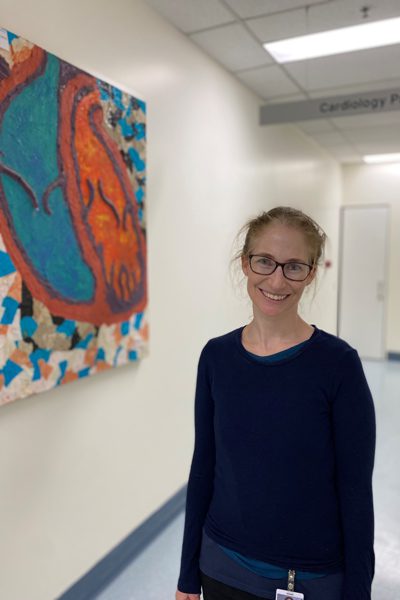Cardiac patients better supported thanks to new service

Genetic Counsellor Alison Rutstein
Cardiac patients and their families throughout Queensland are now even better supported thanks to a new service at The Prince Charles Hospital (TPCH) on Brisbane’s northside.
Since September 2023, two genetic counsellors, Alison Rutstein and Aimée Dane, have formed part of the Cardiac Genomics service together with cardiologist and electrophysiologist Associate Professor Haris Haqqani. The service provides genetic testing and support for patients and their families.
“We are very much an embedded service, meaning we work closely with the cardiologists to ensure that the patient is getting timely access to genetic counselling and ongoing support in a multidisciplinary model that optimises patient care,” Alison said.
The role supports patients who have or are thought to have an inherited cardiac condition, and their families by providing information, supporting psychological needs and promoting informed decision-making around the potential utility and limitations of genetic testing.
“If a genetic cause is identified, we also see the patient’s relatives to offer genetic testing to clarify whether they are at-risk for developing the cardiac condition,” Aimée said.
Based at TPCH, cardiologists can quickly and easily contact the genetic counsellors to discuss a patient’s referral, or to understand the kind of patients who may benefit from genetic counselling and testing.
“Cardiology and cardiac genetics are fascinating areas where there is always so much to learn,” said Aimée.
“The opportunity to work directly with highly skilled and passionate cardiologists and being embedded within the cardiology department is invaluable.
“This is because it allows us to be available to patients attending outpatient cardiology appointments or during admission to hospital. It also enables us to better understand the implications of the cardiac conditions and the important role that genetic testing plays in clinical management and the care of relatives.”
Not only does the model of care enable the team to gain insights into the impact the condition has on patients, but the hope is that the support provided will positively impact a patient’s journey.
“Understanding patients’ stories and experiences is an important part of our job, it allows us to contextualise their decision-making and provide tailored support and counselling,” said Aimée.
“Hearing these stories is a real privilege and helps us to understand the challenges patients and their families commonly face,” Alison said.
“Every patient, and their story, is different and there is always more to learn but we are in the best place to do so.”
